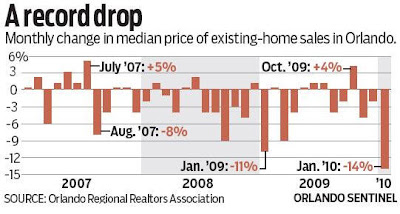Median Home Prices In Orlando Area Plunge 14% In January; Orange County Has 13 Months of Unlisted Foreclosures
 Courtesy of Mish
Courtesy of Mish
Those who thought things are so bad they can’t get worse are wrong yet again as central Florida median prices for existing homes drop the most in at least 15 years.
The raw numbers look ominous, but the figures are distorted by foreclosures and short sales. Not counting distress sales, prices declined 3%. That is still a big drop.
The Orlando Sentinel discusses the situation in Orlando-area home prices plunge 14% in January.
President Barack Obama announced plans to funnel $1.5 billion of foreclosure relief to Florida and four other states. But the Orlando Regional Realtors Association also reported that the median price of the area’s existing-home sales fell 14 percent in January from the month before — the biggest such drop in at least 15 years.
The culprit: bank repossessions and short sales, which made up 73 percent of all resales last month in the core Orlando market. As a result, the median price was only $103,000 in January — down from $120,000 in December and $264,436 at the market’s peak in July 2007.
Kathleen Gallagher McIver, chair woman of the local Realtors group said "This distorted median price does not equate to an across-the-board loss of value for traditional homes in good condition," she said. The association noted that resales of "normal" homes had a median price of $169,990, down less than 3 percent from a month earlier.
Only about one-fourth of the January resales in the Orlando Realtors’ core market — mainly Orange and Seminole counties — were "normal" homes. About half were bank-owned sales, and their median fell to $69,550. About one-fourth were short sales, and they fetched a median of $115,000.
Math Including And Ignoring Distress Sales
Median home prices are not the best way of looking at things. Case Shiller resales of existing homes is a statistically better methodology, but let’s go through the math to see what it looks like.
Including Distress Sales
$264,436 – $103,000 = $161,436
$161,436 / $264,436 * 100 = 61.0%
Ignoring Distress Sales
$264,436 – $169,990 = $94,446
$94,446 / $264,436 * 100 = 35.7%
Including distress sales, median home prices are down a whopping 61.0% and ignoring them, down a 35.7%. The truth is likely between those numbers.
One cannot completely ignore distress sales, yet one cannot look only at non-distress sales which are likely to be pristine houses that some people would be willing to pony up for in this horrible market. Again, median home prices are not the best measurement, but they do provide one view of the carnage.
Moreover, people will see these numbers, and finally decide to to what they should have done long ago: walk away. How many people have lost their job and drained their life savings only to lose their house anyway?
As usual my normal caveats apply.
Before Walking Away Consult An Attorney. There are a lot of potential snags to consider if you go it alone.
Thinking about bankruptcy? The same applies. There are lots of pitfalls and snags. Here’s How to Find a Bankruptcy Attorney.
Orange County Shadow Inventory Analysis
Inquiring minds are reading an O.C. Register interview with Wayne Yamano at the John Burns Real Estate Consulting Inc. about shadow inventory. Please consider O.C. has 13 months of unlisted foreclosures
Us: Your study says that five million of the 7.7 million delinquent homes will go through foreclosure or a “foreclosure-related procedure.” How is this likely to occur?
Wayne: Of the 7.7 million delinquent homeowners, we actually think that only about 1.6 million will be able avoid losing their homes, and that the remaining 6.1 million will lose their homes. We say that there is 5 million units of shadow inventory because we estimate that about 1.1 million delinquent homeowners already have their homes listed for sale, and we would not classify those homes as “shadow.”
Us: Any indication how bad the problem is in Orange County?
Wayne: Orange County has about 13 months of shadow inventory, which is above the national average, but lower than other Southern California metros.
Us: What are the key implications of your findings?
Wayne: Our main conclusion is that prices are likely to keep steady, despite the massive shadow inventory, because the tremendous affordability we have today will create a floor for pricing. However, if the economic recovery stalls or mortgage rates spike, we’re going to see prices tumble again.
Amazing Conclusion
By no stretch of the imagination can any reasonable person conclude there is "tremendous affordability" in Orange County. Moreover, even if prices were affordable, it is a mistake to discount the effect of 13 months of shadow inventory.
Finally it is a mistake to assume the US "recovery" is about to pick up steam. If the economy stagnates (which I think is the best case scenario), that would add to housing pressures. An economic relapse is more likely, and that would put far more pressure on over-valued Orange County.
I find the conclusions of Wayne Yamano rather amazing.



